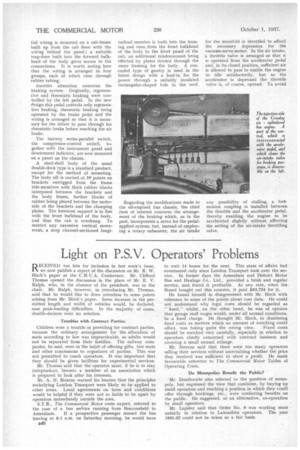Light on P.S.V. Operators' Problems
Page 50

If you've noticed an error in this article please click here to report it so we can fix it.
DECEIVED too late for inclusion in last week's issue, we now publish a report of the discussion on Mr. R. W. Birch's paper at the C.M.U.A. Conference. Mr. Clifford Thomas opened the discussion in the place of Mr. E. V. Ralph, who, in the absence of the president, was in the chair. Mr. Ralph, however, in introducing Mr. Thomas, said that he Would like to draw attention to some points arising from Mr. Birch's paper. Some increase in the permitted length and width of vehicles would, he declared, ease peak-loading difficulties. In the majority of cases, double-deckers were no solution.
Troubles with Contract Parties.
Children were a trouble in providing for contract parties, because the ordinary arrangement for the allocation of seats according to law was impracticable, as adults would not be separated from their families. The railway companies, he said, were in the habit of offering gifts, free scats and other concessions to organizers of parties. This was not permitted to coach operators. It was important that they should be given facilities for experimental services.
Mr. Thomas said that the operator must, if he is to stay independent, becoma a member of an association which is prepared to look alter his interests.
Mr. A. H. Bourne warned his hearers that the principles underlying London Transport were likely to be applied to other areas. Local agreements on fares and conditions would be helpful if they were not so liable to be upset by operators immediately outside the area.• S.T.R., The Commercial Motor costs expert, referred to the case of a bus service running from Beaconsfield to Amersham. If a prospective passenger missed the bus leaving at 9.1 a.m. on Saturday morning, he would have 840 to wait 14 hours for the next. This state of affairs had eventuated only since London Transport took over the service, In former days the Amersham and District Motor Bus and Haulage Co., Ltd., provided a brisk and regular service, and found it profitable. At any rate, when the Board bought out this concern, it paid £53,724 for it.
He found himself in disagreement with Mr. Birch with reference to some of the points about cost data, He could not understand why legal costs should be regarded as " fixed," whilst, on the other hand, he was of opinion that garage staff wages would, under all normal conditions, be a fixed charge. He thought Mr. Birch, in dismissing fixed costs as matters which no amount of watching could affect, was taking quite the wrong view. Fixed costs should be watched very carefully, especially in relation to operators chiefly concerned with contract business and covering a small annual mileage.
Mr. Stevens said that there were too many operators selling their services without ascertaining whether the price they received was sufficient to show a profit. He made favourable reference to The Commercial Motor Tables of Operating Costs.
Do Monopolies Benefit the Public?
Mr. Douthwaite also referred to the question of monopoly, but expressed the view that combines, by buying up small operators and reaching a position in which they could offer through bookings, etc., were conferring benefits on the public. He suggested, as an alternative, co-operation by small operators. Mr. Lapsley said that Order No, 9 was working most unfairly in relation to Lancashire operators. The year 1931-32 could not be taken as a fair basis.




















































































